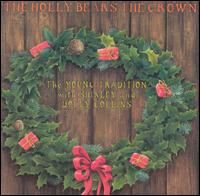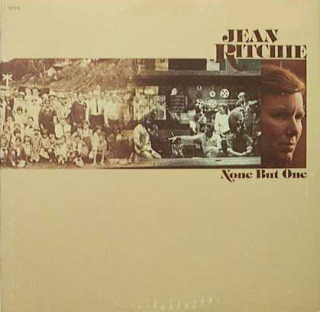
A Christmas carol is a carol on the theme of Christmas, traditionally sung at Christmas itself or during the surrounding Christmas holiday season. The term noel has sometimes been used, especially for carols of French origin. Christmas carols may be regarded as a subset of the broader category of Christmas music.

"Good King Wenceslas" is a Christmas carol that tells a story of a Bohemian king going on a journey and braving harsh winter weather to give alms to a poor peasant on the Feast of Stephen. During the journey, his page is about to give up the struggle against the cold weather, but is enabled to continue by following the king's footprints, step for step, through the deep snow. The legend is based on the life of the historical Saint Wenceslaus I, Duke of Bohemia or Svatý Václav in Czech (907–935). The name Wenceslas is a Latinised version of Old Czech "Venceslav".

The Appalachian dulcimer is a fretted string instrument of the zither family, typically with three or four strings, originally played in the Appalachian region of the United States. The body extends the length of the fingerboard, and its fretting is generally diatonic.
"The Cherry-Tree Carol" is a ballad with the rare distinction of being both a Christmas carol and one of the Child Ballads. The song itself is very old, reportedly sung in some form at the Feast of Corpus Christi in the early 15th century.

Jean Ruth Ritchie was an American folk singer, songwriter, and Appalachian dulcimer player, called by some the "Mother of Folk". In her youth she learned hundreds of folk songs in the traditional way, many of which were Appalachian variants of centuries old British and Irish songs, including dozens of Child Ballads. In adulthood, she shared these songs with wide audiences, as well as writing some of her own songs using traditional foundations. She is ultimately responsible for the revival of the Appalachian dulcimer, the traditional instrument of her community, which she popularized by playing the instrument on her albums and writing tutorial books. She also spent time collecting folk music in the United States and in Britain and Ireland, in order to research the origins of her family songs and help preserve traditional music. She inspired a wide array of musicians, including Bob Dylan, Joan Baez, Shirley Collins, Joni Mitchell, Emmylou Harris and Judy Collins.
"I Saw Three Ships " is a traditional and popular Christmas carol and folk song from England, listed as number 700 in the Roud Folk Song Index. The earliest printed version of "I Saw Three Ships" is from the 17th century, possibly Derbyshire, and was also published by William Sandys in 1833. The song was probably traditionally known as "As I Sat On a Sunny Bank", and was particularly popular in Cornwall.

In the Shade of the Old Apple Tree is a popular song dating from 1905. It was written by Harry Williams and Egbert Van Alstyne (music). Popular recordings in 1905 were by Henry Burr; Albert Campbell; Haydn Quartet; and by Arthur Pryor's Band. Other recordings were by Duke Ellington, Louis Armstrong and The Mills Brothers and Alma Cogan (1962). Bing Crosby included the song in a medley on his album On the Sentimental Side (1962).

Appalachian music is the music of the region of Appalachia in the Eastern United States. It is derived from various European and African influences, including English ballads, Irish and Scottish traditional music, hymns, and African-American blues. First recorded in the 1920s, Appalachian musicians were a key influence on the early development of Old-time music, country music, and bluegrass, and were an important part of the American folk music revival of the 1960s. Instruments typically used to perform Appalachian music include the banjo, American fiddle, fretted dulcimer, and guitar.
"For the Beauty of the Earth" is a Christian hymn by Folliott S. Pierpoint (1835-1917).
Here We Come A-wassailing, also known as Here We Come A-Christmasing,Wassail Song and by many other names, is a traditional English Christmas carol and New Year song, typically sung whilst wassailing, or singing carols, wishing good health and exchanging gifts door to door. It is listed as number 209 in the Roud Folk Song Index. Gower Wassail and Gloucestershire Wassail are similar wassailing songs.
"Shady Grove" is a traditional Appalachian folk song, believed to have originated in eastern Kentucky around the beginning the 20th century. It is set in Dorian mode and was first published in the Journal of American Folklore, dated 1915. There is speculation that the name Shady Grove may be a place-name, a woman's name, or possibly a mondegreen. The song has been widely adopted in the repertoire of bluegrass, as well as being common among old-time musicians of the Cumberlands. Sung by both traditional folk musicians and folk revival musicians, it is sometimes identified as a courting song. The song describes "the true love of a young man's life and his hope they will wed."
Tradition Records was an American record label from 1955 to 1966 that specialized in folk music. The label was founded and financed by Guggenheim heiress Diane Hamilton in 1956. Its president and director was Patrick "Paddy" Clancy, who was soon to join his brothers Liam and Tom Clancy and Tommy Makem, as part of the new Irish folk group, The Clancy Brothers and Tommy Makem. Liam Clancy designed the company's maple leaf logo. Columbia University Professor of Folklore Kenneth Goldstein was also involved in the early creation of the company, which operated out of Greenwich Village, New York, United States.

"In dulci jubilo" is a traditional Christmas carol. In its original setting, the carol is a macaronic text of German and Latin dating from the Middle Ages. Subsequent translations into English, such as J. M. Neale's arrangement "Good Christian Men, Rejoice" have increased its popularity, and Robert Pearsall's 1837 macaronic translation is a mainstay of the Christmas Nine Lessons and Carols repertoire. J. S. Bach's chorale prelude based on the tune is also a traditional postlude for Christmas services.

The Holly Bears The Crown is an album by The Young Tradition with Shirley and Dolly Collins and other guest musicians. The trio "The Young Tradition" sang a cappella folk songs in a style similar to the Copper Family.
“Children, Go Where I Send Thee” is a traditional African-American spiritual song. Among the many different versions of the song, a defining feature is the cumulative structure, with each number accompanied by a biblical reference. Today, many Americans know it as a Christmas carol.

Cowboy Christmas: Cowboy Songs II is the seventeenth album by American singer-songwriter Michael Martin Murphey, his second album of cowboy songs, and his first album of Christmas music.
Nowell Sing We Clear is a four-member musical group that performs an annual yuletide concert series. They have also released a series of related albums.

Christmas Night is a Christmas-themed album by The Cambridge Singers conducted by John Rutter. Most songs are sung a cappella, on others the choir is accompanied by The City of London Sinfonia. It was first released in 1987 on Rutter’s label Collegium Records, and remastered by John Rutter in 2020.

None but One is a studio album released by American singer Jean Ritchie in 1977 on Sire LP record SA-7530. The album was a stylistic departure for Ritchie in that it featured "modern" instruments and production values. It resulted in significant critical acclaim, but the album suffered serious distribution problems. A song from the album, "Now is the Cool of the Day" became an anthem for environmentalists opposed to mountaintop removal.











